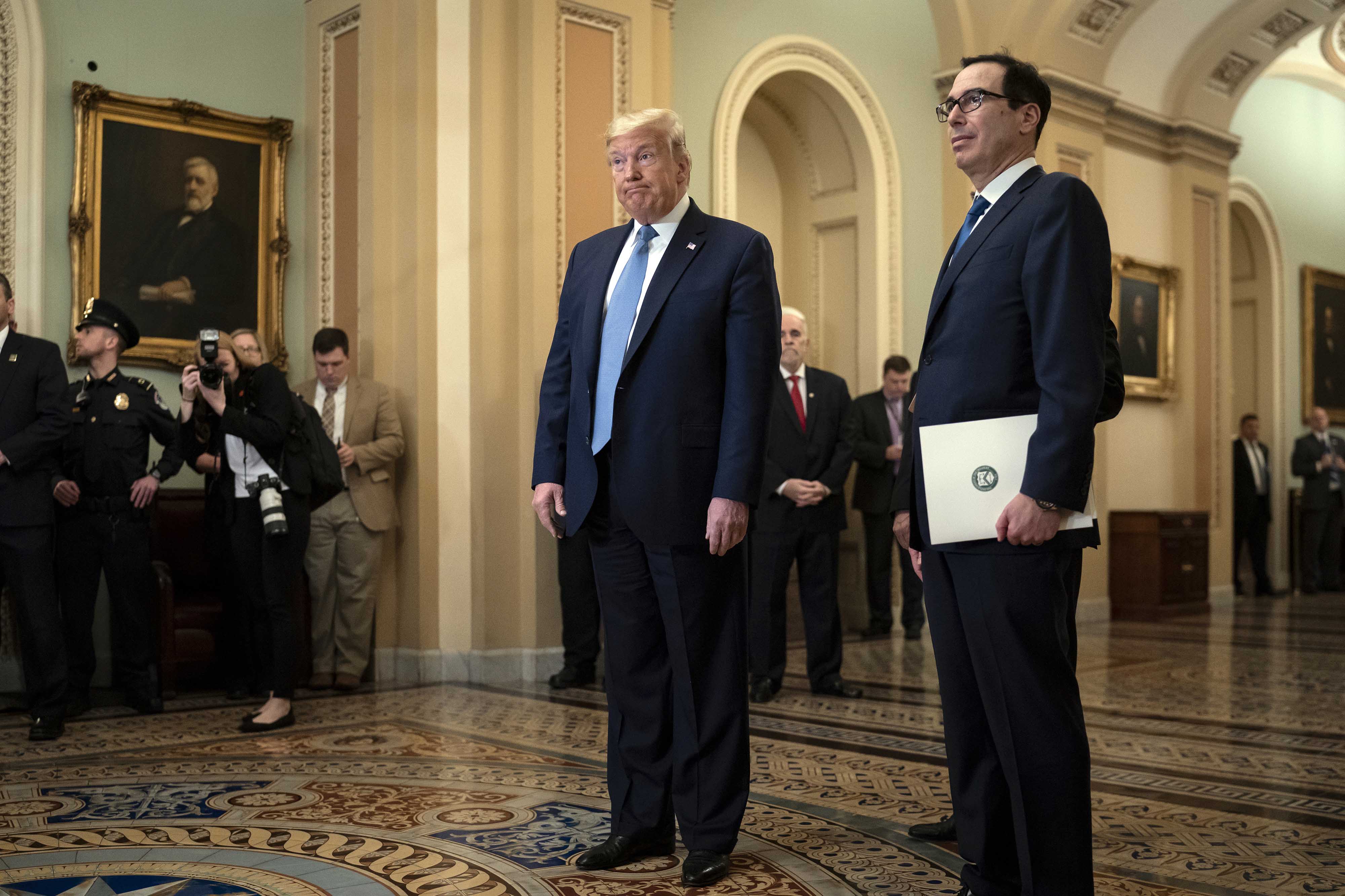
Trump — who was accompanied by Vice President Mike Pence, Treasury Secretary Steven Mnuchin, and chief economic adviser Larry Kudlow — was eager to show that he was taking charge of the federal response to the burgeoning crisis, including the potential financial fallout associated with it. He rattled off a list of ideas to try to mitigate the economic damage from the outbreak, which is dominating the national dialogue just eight months before he asks voters for a second term.
“Be calm. It’s really working out,” Trump told reporters at the Capitol. “The consumer has never been in a better position than they are right now. So a lot of good things are going to happen.“
After the meeting, Trump sent Mnuchin across the Capitol to meet with Pelosi and kick-start a congressional response to what lawmakers acknowledge is likely to turn into an economic downturn — and Senate Majority Leader Mitch McConnell (R-Ky.) said he would defer to the pair as they negotiate a bipartisan agreement.
“The secretary of the Treasury is going to have ball control for the administration and I expect that will speak for us as well,” McConnell said after the meeting. “We’re hoping that he and the speaker can pull this together.”
Even as tentative negotiations got underway, House Democrats grappled with how to deal with the possible spread of the coronavirus at the Capitol as Pelosi told her members that the House would remain in session this week and lawmakers and their staff should continue working.
The timeline for a White House-led legislative plan remains up in the air, GOP senators said, and the group did not discuss a price tag for a potential stimulus package — but lawmakers see an urgency to act as soon as possible.
“Obviously the markets are reacting. This is really hitting the cruise industry, the airline industry. This is going to have an economic impact, and we may need to take extraordinary measures,” Sen. Ron Johnson (R-Wis.) said.
House Democrats are moving ahead with their own economic package that includes paid sick leave for certain workers, extra funding for children’s school lunches, expanded unemployment insurance, and increased spending on social safety-net programs.
Pelosi huddled with her leadership team and committee chairs late Tuesday, and the legislation could be unveiled as early as Wednesday.
“Testing is the priority. Paid family leave. Employment insurance. Job security. Food security,” House Ways and Means Chairman Richard Neal (D-Mass.) said Tuesday. “They’re constructing the package even as I’m walking. You could see something in the next day or so.”
Yet Democrats may not know how much their legislative package will cost by the time they vote on the proposal, although leadership aides privately acknowledge it could run into the tens of billions of dollars or even higher. Democrats will deem this as emergency spending, said the aides.
The Ways and Means Committee will take the lead role in crafting the proposal, along with Energy and Commerce, Education and Labor, and the Agriculture panels.
A major issue for Democrats — beyond paid sick leave — is making sure the millions of children who get subsidized meals at schools continue to be fed even if schools are shut down.
Another key issue is limiting or eliminating costs for coronavirus tests, as well as helping cover medical costs for those who become infected.
GOP senators said there remains potential for overlap with House Democrats’ plan — pending a formal proposal and price tag from the White House, which is still in the early stages.
“If the administration has decided on specific tools, they didn’t share that with us,” Sen. John Kennedy (R-La.) told reporters. “That is not a criticism. This was to allow us to have input.”
“I think the process of winnowing it down and targeting it begins now,” added Sen. John Cornyn (R-Texas).
Trump and Pence pitched Republican senators on several possible measures, including a payroll tax cut, an infrastructure plan, and paid sick leave for hourly employees. The pair also told senators that the Trump administration could take several actions without Congress, including delaying some Americans’ estimated tax payments. Pence told senators that major insurance companies had agreed to cover the costs associated with a coronavirus testing kit.
“They had five or six ideas,” Sen. Lindsey Graham (R-S.C.) said. “Trying to help people that were going to be laid off, targeted packages to parts of the economy that were going to get hit. You know, the inability to travel and hold events, the hospitality industry.”
Graham, though, was noncommittal on Trump’s call for a payroll tax cut, whether temporary or permanent, as an economic stimulus measure. He said GOP senators had a “mixed” reaction to the proposal — and several of them have criticized the idea in recent days.
“I don’t know if that’s the best way to do it,” Graham added. “The president is pushing it. I will have to sit down and think about it. The money that costs, could it be better to applied to [specific] sectors of the economy.”
Even some of the president’s aides were wary of the payroll tax plan. Mnuchin and Kudlow made clear during a meeting of the president’s economic team on Monday night that they, too, were uncertain about pushing a payroll tax cut, according to two administration officials.
After Mnuchin met with Pelosi, he said it was too early to call their talks “negotiations” — an indication that a bipartisan agreement could be weeks away, especially with both chambers scheduled to leave Washington on Thursday for a week-long recess. Instead, Mnuchin said, “we’re having discussions about various different policies.”
Source: politico.com
See more here: news365.stream






